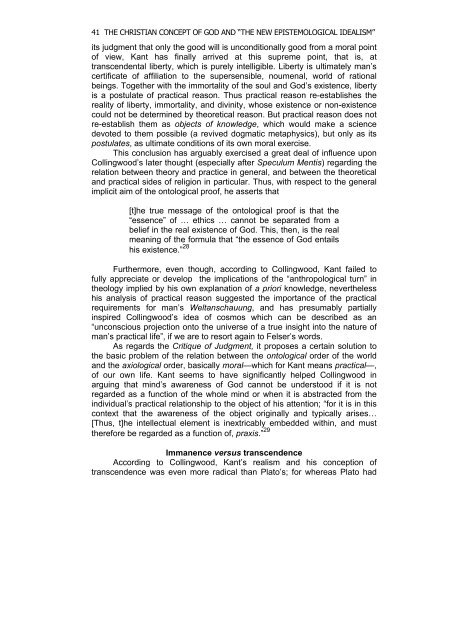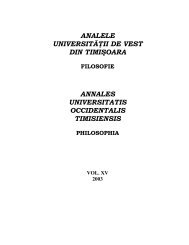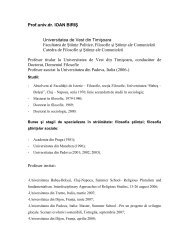VOL. IV (XXI) 2009 - Departamentul de Filosofie si Stiinte ale ...
VOL. IV (XXI) 2009 - Departamentul de Filosofie si Stiinte ale ...
VOL. IV (XXI) 2009 - Departamentul de Filosofie si Stiinte ale ...
Create successful ePaper yourself
Turn your PDF publications into a flip-book with our unique Google optimized e-Paper software.
41 THE CHRISTIAN CONCEPT OF GOD AND “THE NEW EPISTEMOLOGICAL IDEALISM”<br />
its judgment that only the good will is unconditionally good from a moral point<br />
of view, Kant has finally arrived at this supreme point, that is, at<br />
transcen<strong>de</strong>ntal liberty, which is purely intelligible. Liberty is ultimately man’s<br />
certificate of affiliation to the supersen<strong>si</strong>ble, noumenal, world of rational<br />
beings. Together with the immortality of the soul and God’s existence, liberty<br />
is a postulate of practical reason. Thus practical reason re-establishes the<br />
reality of liberty, immortality, and divinity, whose existence or non-existence<br />
could not be <strong>de</strong>termined by theoretical reason. But practical reason does not<br />
re-establish them as objects of knowledge, which would make a science<br />
<strong>de</strong>voted to them pos<strong>si</strong>ble (a revived dogmatic metaphy<strong>si</strong>cs), but only as its<br />
postulates, as ultimate conditions of its own moral exercise.<br />
This conclu<strong>si</strong>on has arguably exercised a great <strong>de</strong>al of influence upon<br />
Collingwood’s later thought (especially after Speculum Mentis) regarding the<br />
relation between theory and practice in general, and between the theoretical<br />
and practical <strong>si</strong><strong>de</strong>s of religion in particular. Thus, with respect to the general<br />
implicit aim of the ontological proof, he asserts that<br />
[t]he true message of the ontological proof is that the<br />
“essence” of … ethics … cannot be separated from a<br />
belief in the real existence of God. This, then, is the real<br />
meaning of the formula that “the essence of God entails<br />
his existence.” 28<br />
Furthermore, even though, according to Collingwood, Kant failed to<br />
fully appreciate or <strong>de</strong>velop the implications of the “anthropological turn” in<br />
theology implied by his own explanation of a priori knowledge, nevertheless<br />
his analy<strong>si</strong>s of practical reason suggested the importance of the practical<br />
requirements for man’s Weltanschauung, and has presumably partially<br />
inspired Collingwood’s i<strong>de</strong>a of cosmos which can be <strong>de</strong>scribed as an<br />
“unconscious projection onto the universe of a true in<strong>si</strong>ght into the nature of<br />
man’s practical life”, if we are to resort again to Felser’s words.<br />
As regards the Critique of Judgment, it proposes a certain solution to<br />
the ba<strong>si</strong>c problem of the relation between the ontological or<strong>de</strong>r of the world<br />
and the axiological or<strong>de</strong>r, ba<strong>si</strong>cally moral—which for Kant means practical—,<br />
of our own life. Kant seems to have <strong>si</strong>gnificantly helped Collingwood in<br />
arguing that mind’s awareness of God cannot be un<strong>de</strong>rstood if it is not<br />
regar<strong>de</strong>d as a function of the whole mind or when it is abstracted from the<br />
individual’s practical relationship to the object of his attention; “for it is in this<br />
context that the awareness of the object originally and typically arises…<br />
[Thus, t]he intellectual element is inextricably embed<strong>de</strong>d within, and must<br />
therefore be regar<strong>de</strong>d as a function of, praxis.” 29<br />
Immanence versus transcen<strong>de</strong>nce<br />
According to Collingwood, Kant’s realism and his conception of<br />
transcen<strong>de</strong>nce was even more radical than Plato’s; for whereas Plato had




